Business
How did Brightree Successfully Work with Clients and Manage Employees During COVID-19
Published
4 years agoon
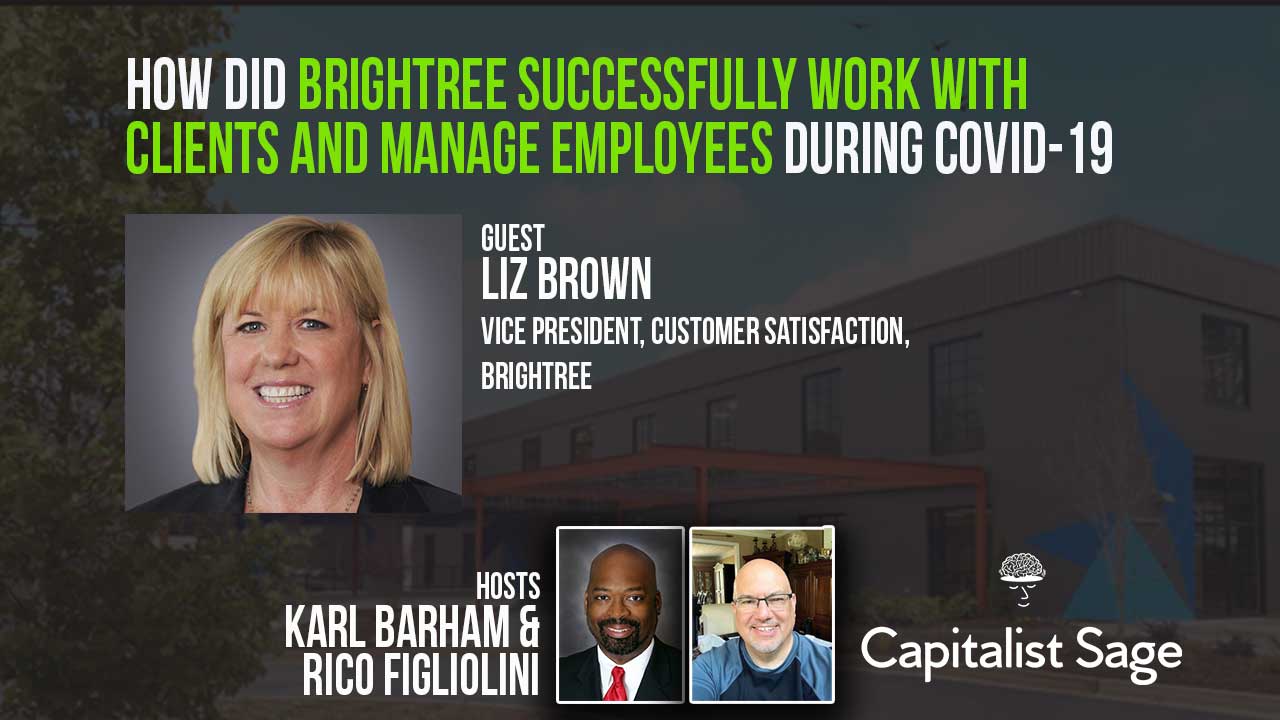
How did Brightree respond successfully to the pandemic, how did they meet urgent customer needs and what initiatives did they put in place to support employees during this time? Brightree’s Liz Brown joins hosts Karl Barham and Rico Figliolini to discuss this and more. Recorded socially safe in the City of Peachtree Corners, Georgia
Resources:
Website: https://www.brightree.com
Timestamp:
[00:00:30] – Intro
[00:02:27] – About Liz and Brightree
[00:03:38] – Initial Response to COVID
[00:05:54] – Employees Working from Home
[00:08:22] – Productivity of Employees
[00:10:24] – Adjustments on the Customer Side
[00:14:49] – Working Through the Summer
[00:18:02] – A New Hiring Process
[00:20:35] – Helping Customers
[00:23:15] – Leaders in Brightree
[00:25:27] – Going Back to the Building
[00:28:02] – Long Term Changes
[00:30:11] – Closing
Prodcast Transcript
Karl: [00:00:30] Welcome to the Capitalist Sage Podcast. We’re here to bring you advice and tips from seasoned pros and experts to help you improve your business. I’m Karl Barham with Transworld Business Advisors, and my co-host is Rico Figliolini with Mighty Rockets Digital Marketing, and the publisher of the Peachtree Corner Magazine. Hey Rico, how are you doing today?
Rico: [00:00:50] Good Karl, how are you?
Karl: [00:00:51] Doing well, doing well. Why don’t you introduce our sponsor for today?
Rico: [00:00:57] Sure. Our lead sponsor is Hargray Fiber. They are a company in the Southeast that provides fiber optic technology and solutions that legacy companies and small businesses can use to be able to do the work that they do out there. They’re involved in the community and they are definitely out there. And they’re not the cable guy. So if you’re looking for fast internet connection, look for a company that can support you, not only in your office and your business, but also your employers that are working off site. Hargray Fiber is the company to go to. So visit HargrayFiber.com/Business, and there’ll be able to work with you. Thanks to them for being our lead sponsor. And I’m going to be playing engineer today. We’re going to let Karl and our special guest today work the half hour of Capitalist Sage.
Karl: [00:01:49] Sounds good. Thank you, Rico. Thank you to Hargray Fiber for continuing supporting both the Capitalist Sage and the community throughout Peachtree Corners. Today it is my honor to have a guest on that can help talk a little bit about her experience and her company’s experience over the past few months as we’ve dealt with this pandemic. Liz Brown is the vice president of customer satisfaction at Brightree, a local software company located right here in Peachtree Corners in Atlanta Tech Park. Liz, how are you doing today?
Liz: [00:02:25] I’m doing great Karl. How are you? Thanks.
Karl: [00:02:27] I’m doing fabulous, thank you so much. Why don’t you tell us a little bit about yourself and a little bit about what Brightree does?
Liz: [00:02:35] Sure. At Brightree we’re focused on technology innovation, and we ensure that we provide a stimulating, supportive place for our team members to work while helping our customers run better businesses as they deliver high quality patient care. So we’re actually an industry leading cloud-based healthcare IT company. We provide solutions and services for thousands of out of hospital care providers. And we just recently located our headquarters to Technology Park in Peachtree Corners, December of last year. And with that move, we reinforced our commitment to innovation and collaboration amongst our team. In light of this year’s events, we’re proud of how we’ve executed on that commitment and ways that we’ve helped us keep Brightree a fulfilling, supportive, and stimulating place to work while providing opportunities for local collaborations. So at Brightree, my title is vice president of customer satisfaction. I manage our implementation and customer support teams. But I also lead our facilities teams and we developed a pandemic response plan for Brightree earlier this year.
Karl: [00:03:38] So I’m curious to ask, when the pandemic started, what was your response and your feelings about it and how did you approach it? You and Brightree approach responding to some of the challenges the pandemic brought?
Liz: [00:03:53] So first and foremost, our priority was, and has always been the health, safety, and wellbeing of our employees. We needed to figure out how we could ensure their safety while continuing to keep our customers operational during the time when care and services for our customers was arguably the most important thing ever. So to address it, we really quickly transitioned to work from home, in almost four days actually, and implemented new work streams and strategies that would help our employees excel in the working from home, but also keep the continue of customer support up and running. So some of the things we did, so for example, our executive team started daily huddles on the very first day. And we added in the site leaders from our remote offices to ensure there was an open line of communication as we rolled out our pandemic response plan across Brightree. We use these meetings to raise barriers or concerns that came from the employees. We had employees, for example, who didn’t have internet at home, and we needed to address that. But we also used it to address any concerns that might’ve come from our customers so that we could tackle them swiftly and promptly. And it was from these daily huddles that we have the executive team. We also established an employee engagement team. So we pulled together a group of 20 employees across the company, one representing each department. And they worked with me and our people team leader really closely to provide sort of real-time insight and the pulse what was going on in the day to day amongst the team. And we met with these folks twice monthly and made sure that our pandemic plan that we had in place was working for them, but also that they were engaging with the rest of the organization. So we could get that real-time feedback and direct path right back to the executive team, where there might be areas that we had to address for health, safety, and wellbeing. And we encourage those employee engagement team members to collaborate and create collaboration events with their team. As we all transitioned to working from home.
Karl: [00:05:54] Can I ask a question about, as employees transition to working from home, the informal interactions that people had in the office, what were ways that you were able to help at least close the gap from that, just, you know, working together, the huddles around the coffee. Are there things that you’re able to do to help with that?
Liz: [00:06:17] Yeah, so we did, we established sort of some fun events. So first off we established office hours. So utilizing zoom, which we all had to adapt to, we opened up office hours on Friday afternoon from one to five, and it was an open zoom where people could really just drop in. Like you would’ve dropped in before you might’ve walked by somebody at the coffee machine. You might’ve walked by somebody in the hub getting, you know, a glass of water. Now you just dropped in and everybody knew it was open. So that they could just engage with each other. Over time those became more, a little bit more formal and more fun. So there were happy hours. There were wine tastings and people came up with ways to engage with
each other from home over zoom, of course. But it did sort of try to mimic that whole drop by, how are you kind of thing.
Karl: [00:07:05] Another follow up question on the employee side is, as people had to deal with childcare at home and different work environment, the remote schooling and all of that, were there things that you found people innovated and came up with to navigate the new norms that was happening throughout, you know, March, April, May when this first started?
Liz: [00:07:28] Yeah. And, I’ll tell you, so you know, the wellbeing of the employees was one of the most, was forefront in all our decisions in how we operated and, you know, being that we’re a customer facing organization, what we did is gave the employees the opportunity to manage their workday. So to your point, people with middle-school children had to figure out how to help them get on Zoom to make sure they could get their homework done. But then there were people who were having to adapt to childcare and eldercare and how could they get that done and also get their work done during the day. So we gave them the opportunity to set their work hours so they could adapt both managing their wellbeing from a work perspective, but then also keep those commitments they had to their family. And I think that worked well because when they had those, you know, flexible work hours and were able to adjust their schedule, they could feel like they could balance and get everything done during the day.
Karl: [00:08:22] One of the great things I thought that I saw happening and your, Brightree is a great example of this, companies, corporations had dabbled in this for years. Employee suggestion boxes, they’ve done an install. What the COVID pandemic did, it kind of forced us to make a decisive action, to help people be more able to work and operate from home environments, flexible work schedule. There was always the critique of it in the past that you couldn’t get the same productivity out of your employees, if you let them have more freedom and flexibility, but we were forced into it unfortunately this year. How have you seen the productivity impact on employees during this pandemic? Especially after that first initial wave where we were all in shock of course, but how did it normalize?
Liz: [00:09:14] So I will tell you this, it’s one of the things we’re most proud of the entire Brightree team is our productivity has really been consistent from the day we moved home until today. So yes, we do manage our organization by KPIs and metrics, and we haven’t seen those falter and I think it was providing the employees the flexibility in their schedule. And being able to give them that opportunity to have that wellbeing and being able to take care of themselves and their family, that they were able to maintain the productivity. And we also haven’t seen any dips from a customer satisfaction perspective. You know, we’ve been very consistent. We do use the net promoter score, NPS scoring with our customers, and it’s been extremely consistent since March. So I think by putting the employee safety, health, and wellbeing, first and foremost, you know, I run a customer support organization and I always say, happy employees makes happy customers. And we tried to follow that mantra as we moved to working from home so that everyone felt, you know, not only safe, but they could work and do what they needed to do in the time that they could do it and be productive for the company.
Karl: [00:10:24] So you’re in an interesting industry in space where, a lot of your clients and customers are in the healthcare and healthcare based businesses. And this pandemic, we all know absolutely hit right smack dab into that part of our economy. What were some of the things you have to do to adjust on your customer side, your customer facing interfaces, to adapt to this pandemic year?
Liz: [00:10:50] So, the same way we sort of went right at it from an employee perspective, we out of the gate do the same thing with our product management team on the customer side. So we very quickly engaged with our customers. One-on-one conversations with the salespeople had. We also held, peer to peer community groups. We also engage with our customers through coffee talks and we very quickly, you know, we established by a mantra that we use, which was ask, listen, act. And we used it both for our customers and employees. So in the very beginning, from a customer perspective, we were asking a lot of questions. You know, examples might include how are they getting PPE? Because our customers needed to have PPE, you know, and were they able to get PPE? And we actually had forums in which customers in certain cities were sharing with each other, you know, best practices around how they were actually acquiring PPE, which we all know was in a shortage in the beginning and giving each other resources.
But what we did from a Brightree perspective, sort of after asking is then we sort of hit it from a product perspective. We are a product technology company and we very quickly rolled out product updates so that we could support them as customers. That was everything from COVID 19 diagnosis codes, giving them the ability to confirm a delivery with a photo instead of a signature to enable social distancing. We developed a COVID 19 impact analytics dashboard, which we made available to our customers at no charge. So they could get a better understanding of their operational and financial standing amid the pandemic. And we also created, as I said, forums. So they could engage with each other. Sometimes, you know, our customers learn a lot from each other, especially ones that were regionally situated. And from that, we were able to support them both through our community, but also through other customers.
Karl: [00:12:46] I think you highlighted a couple of things there that was really insightful for first small business owners or large business owners in when dealing with an emergency or a shock to the system in the way that we had to this year, but that interactions and leveraging your touch points with your customers. Can you tell me a little bit more about those forums? When you couldn’t get people together physically, how did you use technology and the tools that we have today to create a safe and friendly environment for customers to communicate with you?
Liz: [00:13:21] So within the Brightree product itself, we have an online community. A community forum on which customers can engage with each other. And we had a lot of information that we could share with the customers. And then the customers were able to share with each other. So first and foremost, we very quickly got out in the community forum the necessary information they needed to be able to respond to the pandemic and continue patient care. But then we also added some engagement activities. So we had coffee talk webinars where customers came together themselves, a customer would come and they would talk about a key issue or strategy that they were working on. We also have an executive advisory board,
which is made up of 15 to 20 key customers that we engage with usually twice a year. And we started engaging with them once a month, you know, Zoom being our platform. But we brought them together to understand, you know, what their evolving needs were so then we could feed the rest of the customer base. And we found that through engaging either through the coffee talks, through the EAB, or sales going back on one-on-one conversations, we’re able to engage with the customers, understand their evolving needs, and then very quickly be able to act against those and meet them, whether it’s through a product or a service or just some level of support. Sometimes we had to find resources for them that they needed to be able to service their patients. And we were able to make that happen for them through the community.
Karl: [00:14:49] I love the blended methods and I think one of the key takeaways from that is, no matter the size of your business, varying the ways that you facilitate two way communication, not just one way, but through the advisory board, you’re getting feedback on tough topics.
You’re doing it in informal settings, and then you’re leveraging your sales team and your account management teams. They have one-on-one conversation in multiple ways. I think very often small business owners, they’ve fallen in love with social media in a way of blasting out one directional information. But this year showed where creating a community forum where people can facilitate two-way communication can happen in the digital way, as well as the old fashioned pick up a phone or today a Zoom and get online and have face to face or real conversations with people. That’s very, very wise approach to do that. And you can probably see some success with that. I’m curious, I wonder, from a business standpoint as you started going through the summer, a lot of businesses were stuck in neutral if you’d call it during the pandemic. How was it for you in continuing to execute the plan you walked into the year with?
Whether it’s on hiring, whether it’s on market share. Were you able to continue to grow and
execute throughout the pandemic?
Liz: [00:16:23] So on both fronts, we were extremely fortunate. So from a hiring perspective, we actually were able to hire throughout the pandemic. Absolutely. And we even had our intern program this summer, which I know is quite unique. So we were able to bring in remote interns. So they got the opportunity to do work in a remote environment. We brought those in, in our marketing and sales team. And, you know, we all had to figure out how to be agile and find new ways to support the new hires in our environment, in this in-home dynamic. And we did that. As part of our onboarding process, we put in place a mentor program. So when you think of a mentor, sometimes people think of it as your boss. And we actually took a different approach.
We asked the hiring manager to pick someone who would be that person they could go to, to ask questions that you don’t normally want your boss to know you don’t know the answer to. But somebody in this remote time that can sort of steer them through the halls. Even though they were virtual halls, right. That they could, you know, very quickly reach out to on teams because they’re in a meeting and they don’t know who this person is that they’re, you know, somebody who’s asking questions, so they don’t know what is. But somebody who’s just there for them all the time as if they were there in the office. So we had to try to figure out how to simulate that environment from an onboarding perspective. So yes, we were very grateful and very thankful that we continued to hire. And actually from a business perspective, we were extremely busy.
Our customers were very busy and we were very busy along with them and from a business and
financial perspective, we’ve done quite well. Yes, we were able to grow through the pandemic and very appreciative of that.
Karl: [00:18:02] That’s fabulous. To hear what, to hear another company that’s, you know, faced with a crisis, still figured out how to pivot on, how do adapt quickly and that’s one of the things that great companies often are able to do. I am curious about, as you were talking about hiring through that, I remember a time when the hiring process involved, someone coming in having an interview with 12 people on a team for a full day and then they go home. And so there was an element and a premium put on for hiring managers and teams to see the person, they were looking for certain things. How has 2020 change people’s thinking on what’s important in the hiring process, interviewing. And were you able to do anything to change that process that you think you might want to keep even beyond this season of the pandemic?
Liz: [00:19:05] To be honest, we actually have, we initiated a process with our parent company Resmed, gosh, probably six months ago. We actually utilize a product called Hire View. So as part of the original, as part of the first level of hiring, the hiring manager provides questions to the recruiter. And the actual applicant has to, through Hire View, which is a zoom like product, present the answers to those questions, right? So you sort of get that in-person feel, the hiring manager gets before the interview process even started. And once they pass through the hire review, Then we’ve been using a team interview process in person for all of our interviews. So we’ve started to use that as a best practice across the company. Where we bring in, let’s say for example, in my area professional services, we’re hiring a new manager and that new manager, once they’re on board is going to work with a lot of different departments in the company. So I select a person from each one of those departments and they work on a team interview and each person has a role and responsibility on that interview and they participate as a team. So we learned, and we figured out when we moved to working from home, we could do the same exact process with Zoom. And it worked just as well. So the interview candidate was still engaging with all the same people that they would have if it was in person. And we found actually it worked quite well. So it was, that was a good, best practice. And we’ll continue to use it if, you know, at some point in time, hopefully here very soon we’ll use it in person. And if not, we’ll continue to use it virtually.
Karl: [00:20:35] I’m curious if you follow that same thinking with your customers. I’m sure when you’ve, find acquiring customer there’s some process of onboarding them, especially if you’re implementing technology. How have you adapted, based on the social distancing constraints where you might’ve walked in and jumped on someone’s computer, are there things that you were able to figure out to help with that part?
Liz: [00:20:59] Yes. And that was one of the first things that actually my department in professional services had to adapt to very quickly. So one of the first things we do when we onboard a new customer is we go onsite and we do an operational workflow analysis and design. So we had to really quickly pivot and determine, you know, figure out how are we going to now do that remotely. Because what we’re doing is we’re going in and talking with all the key business leaders about how they, in a future state, want to utilize our technology. And it’s very
much a sort of in-person engagement. And in the March, April, May timeframe, you know, really through the summer, that was not something that we were equipped to do, nor was our customer. So we needed to create a virtual environment in which to do that. And those went very well. But I will tell you, as we went through the rest of the implementation, there was a point in time where the customer said, this has all been great, but now we all need to get together. So we had to figure out how to do that. And I will tell you, starting about a month, month and a half ago, we started to do it. We have a very specific protocol and policy and we need to work very closely with the customer. So that, for example, you know, from a social distancing perspective, when our consultant goes in that they’re able to meet the requirements that we put in place, because again, the health, safety, and wellbeing of our employee was most important. First and foremost, the employee had to volunteer. There was no asking anyone to go. They had to totally volunteer. And because, you know, our consultants are road warriors. They’ve been home for quite a while. So we had a few volunteers very quickly, but they were very appreciative of, we put in place our own pandemic guidelines for in-person meetings. And we had to ask the customer to abide by that same protocol. Now, being that a lot of our, you know, our customers do patient care, so they’re also in healthcare. They very much appreciated it. So I would tell you, in the last two months, we’ve probably done six of those. And they were very important because they were that end of the process for the customer coming up on our technology and they needed that in-person contact. But it’s, you know, ensuring the health, the wellbeing and the safety of the employee was as important as for the customer.
Karl: [00:23:15] I think one of the things that’s becoming really apparent in my conversation with you today is to implement all these things. When I know sitting in January of 2020, most of the world would not have realized what had happened. It takes really strong leadership to do that. What’s some things about Brightree that makes its leaders able to respond the way that it did this year?
Liz: [00:23:44] You know what I would say, we’re extremely agile and we’re extremely adaptive. We’ve got an excellent executive team. We all work very well together. We’re all very strong leaders in our own domain. And you know, we care about our employees and we care about our customers, right. So we came to it, you know, I know I keep saying it, health, wellbeing, and safety. But it wasn’t only for us, but it was also to ensure our customers can continue doing what they needed to do, which was provide patient care. So, you know, the Brightree executive team, we handle a challenge very well. We’re extremely adaptive and we did turn on a dime. We literally turned on days. And we sent everybody home and we had our policies and procedures in place. Because you’re right. In January, imagine we had just been our office for 30 days. We were all so excited. We’re in Peachtree Corners, we’re in a brand new building. We have this extremely beautiful building, great collaboration area. We’re all so excited. I mean, everybody was really pumped. It brought new energy to the company. And then with, you know, unbeknownst to us in three months, the whole world’s going to change. But I will say we brought that energy home, not to say there wasn’t in the month of March, you know, a total assimilation. You know, everybody at home now, like, you know, your routines totally changed. Your workdays totally changed. But we put forth the effort because we knew our customers were doing direct patient care. And everybody was looking at the news and everybody didn’t know
exactly what was going on. So we needed to continue to do what we needed to do and be strong, you know, stay strong as one of our mantras. And we did that for not only our employees, but also, you know, for our parent company Resmed and our customers.
Karl: [00:25:27] So with the beautiful building that’s been right here in Atlanta Tech Park, have you begun to think through the strategy with the vaccine, multiple vaccines on its way? How you start thinking about bringing people back into the building? And what are some of the things you might keep from this year going forward? And what are some of the things that you definitely want to get the team back together in the building?
Liz: [00:25:50] We actually already started coming back. So, I guess it was about a month ago we, you know, there’s a portion of our employee base that really would prefer to work in the office. So we have a very, you know, we have a very large office, but we set, we did a very soft open and set the opening at 25 people at a time. And one of the first things that we needed to do was figure out, you know, again, how can we do this safely? And we know that there was some mainstays that had to be there, social distancing, you know, health checks, you know, how are we going to make sure that somebody who’s coming into the office should be in the office? How are we gonna know who’s in the office and when they’re in the office? And if in fact we ever had an issue from a COVID perspective, how could we do contact tracing? So we partnered and actually bought a new technology from a company based in Alpharetta. I love that it was local called Mathtitian and they gave us the ability to implement the solution that gave really all the facets that we needed. So for example, today, if an employee needs to go in, they schedule themselves and they schedule when they’re in the office, they’re sent through the technology, either SMS or an email, a prescreen health at a station that they need to do before they can come in. And once they’re approved, then we know where they are. So we can schedule them, they can do their pre-screen. But then we also that enabled contact tracing for us. And then by working with Mathtitian, we could develop our floor plans so we knew we had physical distancing. Whether it’s, you know, these two people sit in and the workstation is at least six feet apart. Or if there’s a group that wants to go in a conference room in which seats would they sit, so we make sure there’s physical distancing there also. So we’ve started that process. Like I said, it started a month ago and it’s been going well. You know, we’ll see as time goes on and as the months go on, one of the important factors, you know, we look at is health and safety. So we’re checking the metrics and we know what the metrics are for the Atlanta area, for the Gwinnett County and Peachtree Corners area. But we, you know, keeping that employee safety is the primary goal. We’ll continue to evolve the plan as time goes on.
Karl: [00:28:02] Well, I tell you, all the things that Brightree’s done now going to help their employees adapt of customers, figure out how to be more successful through this year. I’m glad to say that, you know, we’ve got a company locally that’s leading the way in helping figure this out. It’s such a tough year. I’ve got a last question if I could ask, you know, when everything that went through this year, both professionally and personally, that most people have gone through, is there something that you implemented or did this year that might’ve been caused by the pandemic that you think can live beyond this? When this is all said and done, and the pandemic
has gone away and we’re all vaccinated. Are there things in the business that you’ve changed that you think have a long term future within your organization?
Liz: [00:28:51] I think we’re going to look at the opportunity that we gave the employees to work from home and have that flexible work schedule and have that, you know, focus on wellbeing and balance. That will absolutely continue. I mean we’ve heard it loud and clear from a, well, we do pulse surveys with our employees every six months. And that came through loud and clear. We’ve done two already, cause we did one right after the pandemic. But, you know, reinforcing wellbeing and balance. Not that it wasn’t in the forefront of our culture before, but I believe that that will continue to be on the forefront. And then the level of communication. So I talked about in the beginning, you know, the daily huddles. We also had town halls and we had those every week for quite a few weeks. And we’ve moved now to, you know, once a month, every other week or once a month, depending on the time period. And that level of communication, maintaining that. Because that gives the, you know, the engagement level with the employees without a doubt. But I think some of the, you know, the other aspects of our culture, you know, agility and change and you know, the care that we give for both our customers and the service excellence, those will all continue. But I think we’ll look at that flexibility for the employees so that they can, you know, live their best life. And also, be the best they can be for Brightree.
Karl: [00:30:11] There was one thing that became apparent. Although this year we had to physically distance for safety, I think Brightree and your team and the rest of the organization did a great job of actually keeping people together. So I don’t know if this term social distance really meant the same. I think communicating people keep people connected. We’ve done a better job probably as a society. You definitely would put it in your business, even though people may be physically distanced you were able to shrink it a little bit and keep people at least socially connected throughout this. Which is fabulous. Well, I’d love to thank you so much for taking some time out of your busy schedule to chat with us on the Capitalist Sage. I’d like to thank Liz Brown, the vice president of customer satisfaction at Brightree right here in Peachtree Corners for your insights and sharing your experience. There’s a lot of companies that struggled through this, they implemented some of the things you’ve had. Some didn’t. But what you’ve highlighted and shared with folks that there’s a different way to think about adapting. And I know a lot of people took a turtle mentality and just kind of, you know, hunkered down. But there’s ways to find innovative ways to continue to live your mission in your organization. And thanks for sharing that with us today. I’m Karl Barham with Transworld Business Advisors of Atlanta Peachtree. Rico and I have the pleasure to talk to local business leaders and owners, here in Peachtree Corners and surrounding areas, to talk about things that can help any business owner, whether it’s a small business, a large corporation or anywhere in between. It’s really been a pleasure to share insight from folks that are having success in doing that.
Transworld is our business and we help consult. I work with small business owners when it comes time to make those important decisions in life, around exiting their business, whether it’s selling or growing through acquisition. So we are an M and A firm and business sales firm that helps people with doing that. And so you can always reach out to myself or anyone on my team to schedule a consultation. You can always find us at www.TWorld.com/AtlantaPeachtree. Rico, why don’t you tell me a little bit about what you’ve got going on over the next couple of weeks?
Rico: [00:32:31] Sure. I’ll keep it short here, but we’re working on Peachtree Corners Magazine. The next issue, Faces of Peachtree Corners is the feature story. Along with some of the things that we have in there. We just finished the photo shoot here at Atlanta Tech Park last night for that feature. So we’re doing, yeah, magazine’s coming along. We’re on deadline. We’ll be done in about two weeks and that’ll be out the first week in December to everyone. In the meantime, you can go online at LivingInPeachtreeCorners.com to find out more information. In fact, one of the stories we have on there was the internship program at Brightree and how that worked. And that was a phenomenal story I thought. It did really well. Good to see companies out there like Brightree doing that type of work too. A lot of these kids didn’t have internship opportunities after COVID started. So, not very good for some of them because they looked forward to doing it and that becomes sometimes a job entry point for these students. So good thing they were able to do that. As far as what I do, social media marketing content work, curation, video production, photography, you can find my work at MightyRockets.com or look me up on LinkedIn, Rico Figliolini or Mighty Rockets. Either way you can find me. So, and let’s not just forget our lead sponsor Hargray Fiber again, who is a major lead sponsor for not only Capitalist Sage, but the other programs that we run, the other podcasts that we do in the city. So all good. And I appreciate Liz for being with us also, for being part of the show this episode, it was really good. I learned a lot as well, so. And I apologize. Most people didn’t know when we started this, there were technical difficulties getting this off the ground, but we finally got it through and I appreciate Liz’s patience with that. Thank you Liz.
Karl: [00:34:20] Thank you Liz and everyone at the Brightree team. Have a great day.
Related

Business
Music Matters Productions Expands Peachtree Corners Headquarters
Published
2 weeks agoon
May 21, 2025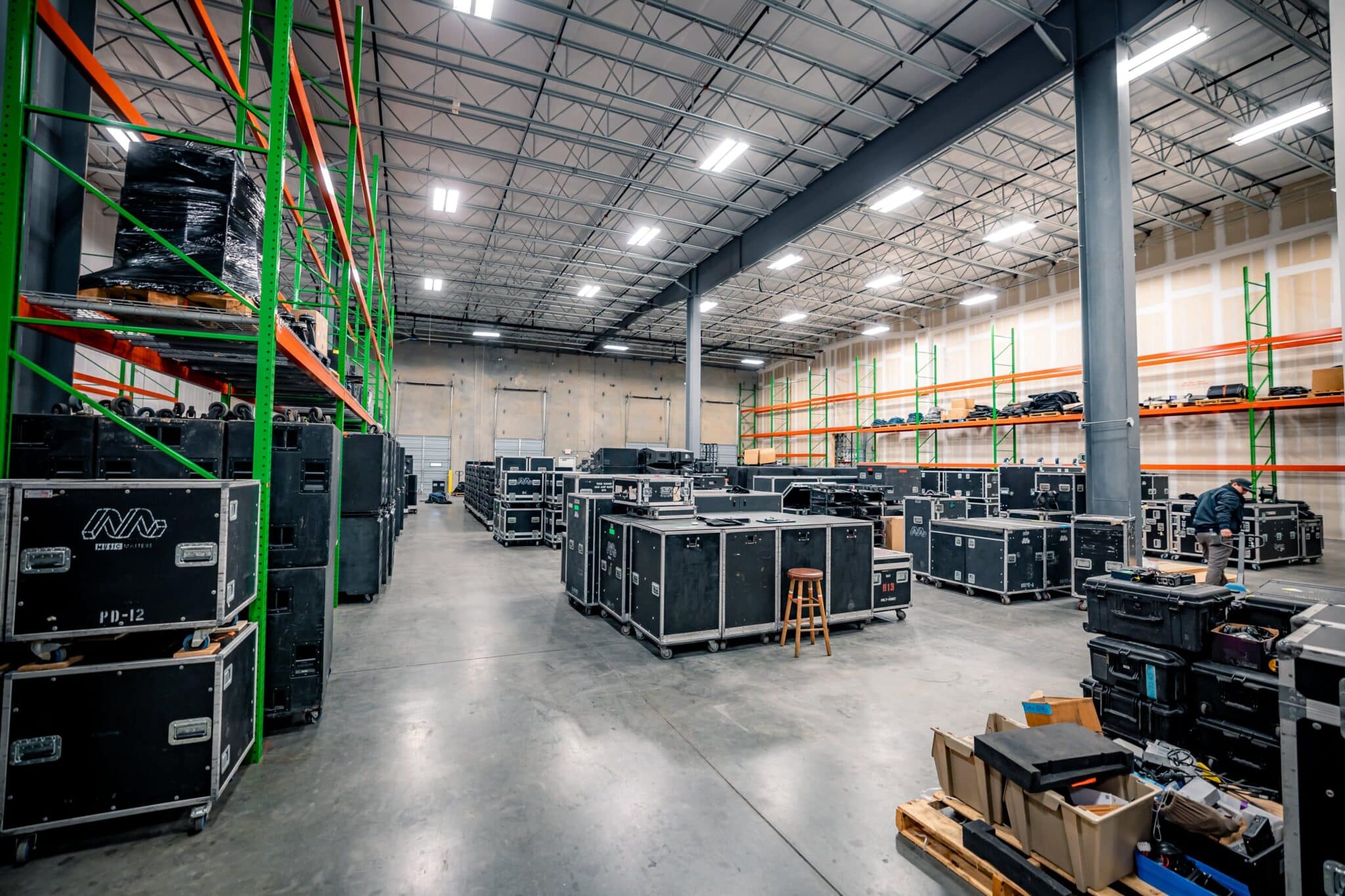
Company adds 20,000 square feet to meet growing demand
Music Matters Productions (MMP), a premier provider of audio, lighting, video, staging and rigging solutions, has expanded its metro Atlanta headquarters, increasing the total warehouse footprint from 40,000 to 60,000 square feet.
In addition, MMP has opened a second 10,000-square-foot building directly across the street to house its growing corporate production division.
The expansion comes in response to increased demand across touring, festival and corporate markets, as well as the continued growth of MMP’s high-end gear inventory. With a fully dedicated shop for each department, including audio, lighting, video, rigging and staging, the new layout provides more space for show prep, pre-rigging and crew coordination, allowing for even more efficient load-ins and streamlined execution.
New features
The rigging department now features a new mobile motor hoist test stand, allowing for in-house motor certification, a service that’s now available to external clients in the production community.
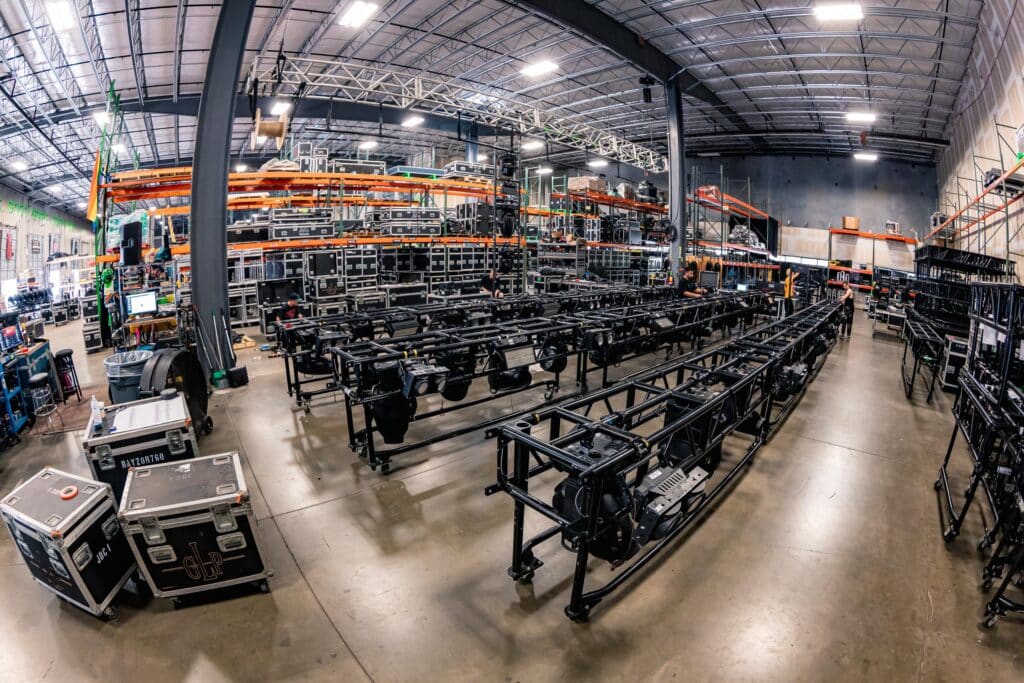
Five new truck bays were added in the process, as well, bringing the total number of bays to 17 — an important upgrade for MMP’s fleet and the increasing number of shows moving through the warehouse each week.
“This growth is a direct reflection of the work our team puts in and the trust our clients place in us,” said Aaron Soriero, owner of Music Matters Productions. “We didn’t expand for the sake of being bigger, we expanded because we needed the space to do the job right. More room means tighter prep, faster turns and better support for our clients.”
Expanding operations
The expanded warehouse and building across the street include additional offices, mixed-use areas and a dedicated repairs department, giving the team more capacity to prep, collaborate, QC and scale for increasingly complex events — both corporate and entertainment.
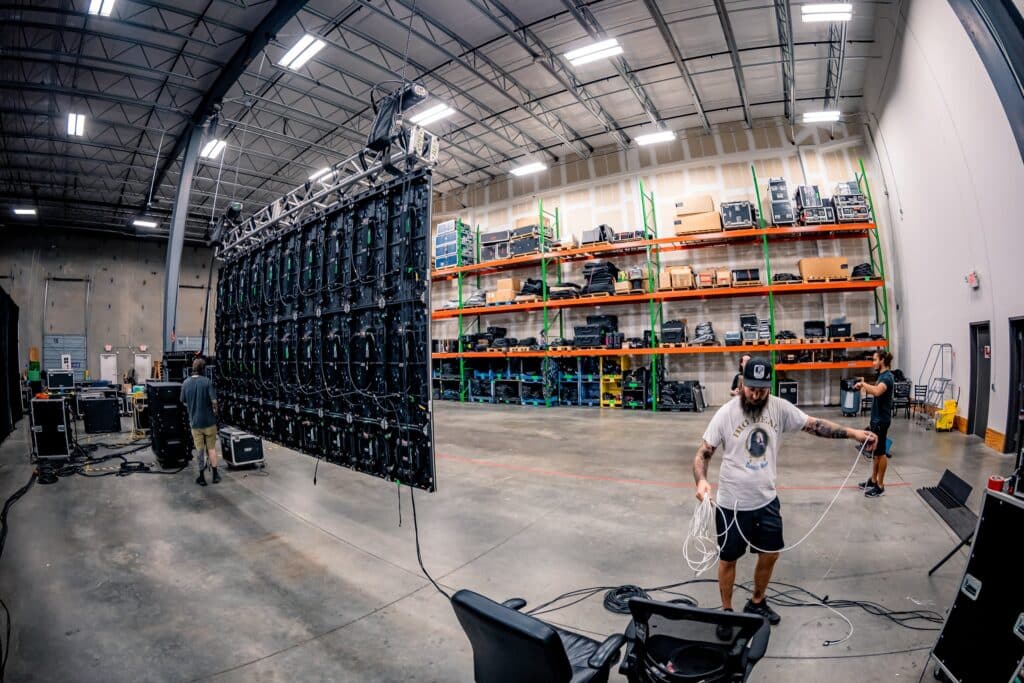
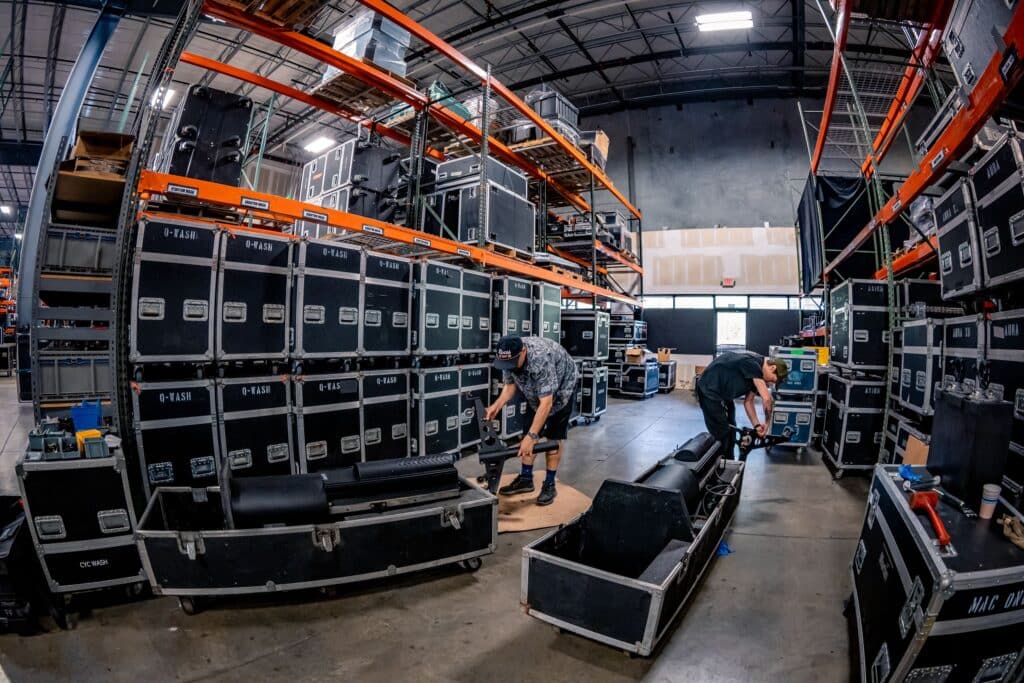
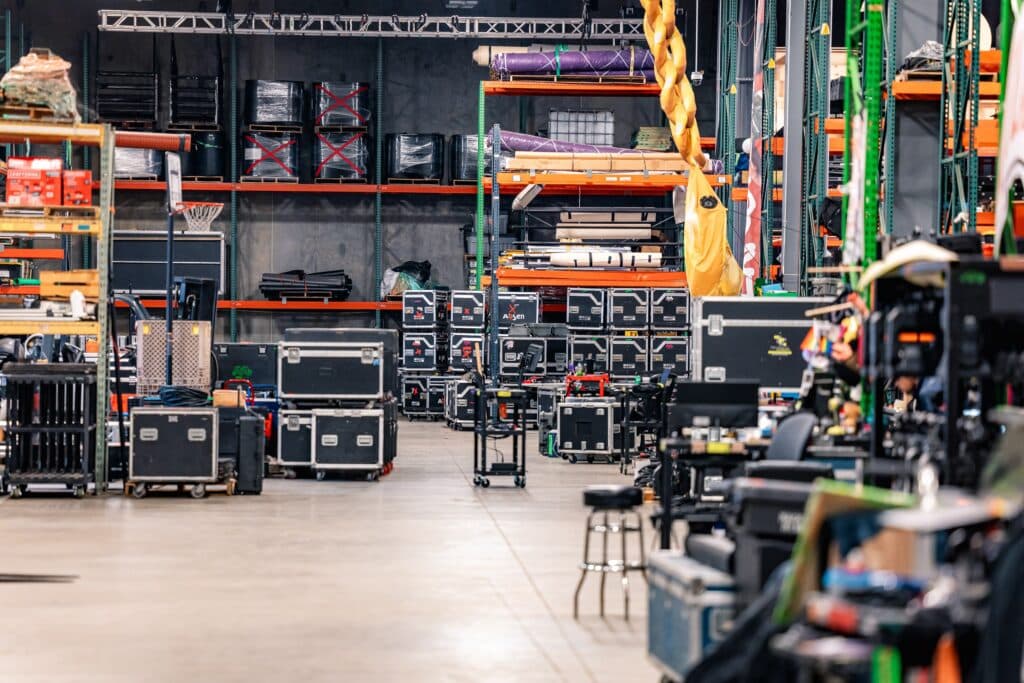
With a reputation built on reliable gear, experienced crews and an enhanced client experience, MMP continues to solidify its role as a go-to production partner for events of every size and setting — whether it’s a beachside festival, a stadium tour, brand activation or a high-stakes corporate show.
About Music Matters Productions
Music Matters Productions is a full-service live event production company based in Peachtree Corners, Georgia, providing industry-leading audio, lighting, video, rigging and staging solutions for tours, festivals, brand activations and corporate events across the country.
Known for its high-end inventory, seasoned crew and deep dedication to doing the job right, MMP supports hundreds of productions each year and is trusted by clients nationwide.
For more information, visit mmp-atl.com.
Related
Business
From Boardrooms to the Himalayas: Vandana’s Journey to Purpose and Growing with Intention [Podcast]
Published
2 weeks agoon
May 19, 2025
How one family blends operational clarity, conscious leadership, and community-driven values to grow their business — together.
In this episode of UrbanEbb, host Rico Figliolini chats with Vandana Aggarwal, VP of Operations at Aggarwal Real Estate, about the winding road from global consulting to family-run commercial real estate in Norcross, Georgia. With honesty, warmth and insight, V shares how she went from working 80-hour weeks in corporate strategy to rediscovering clarity in the mountains of India — ultimately helping transform her family’s business into a community-driven real estate firm managing over 50 shopping centers.
The conversation weaves together themes of leadership, legacy, operational excellence and the transformative power of both AI and yoga. It’s a story about clarity, courage and conscious growth — both in business and in life. This is another episode you won’t want to miss.
Episode Highlights
- Why Vandana left a high-powered consulting career to join her family business
- How hiking Kilimanjaro and studying yoga in the Himalayas changed her leadership mindset
- The operational overhaul she brought to Aggarwal Real Estate to support growth
- What it’s like working side-by-side with your dad, siblings, and 700+ tenants
- How the company rebranded with intention and built a mission around “building communities as a community”
- Where AI is reshaping real estate—from lease drafting to property management—and where it still can’t compete with people
- Leadership succession planning with siblings at the helm
- The importance of clarity, calm, and conscious growth in both business and life
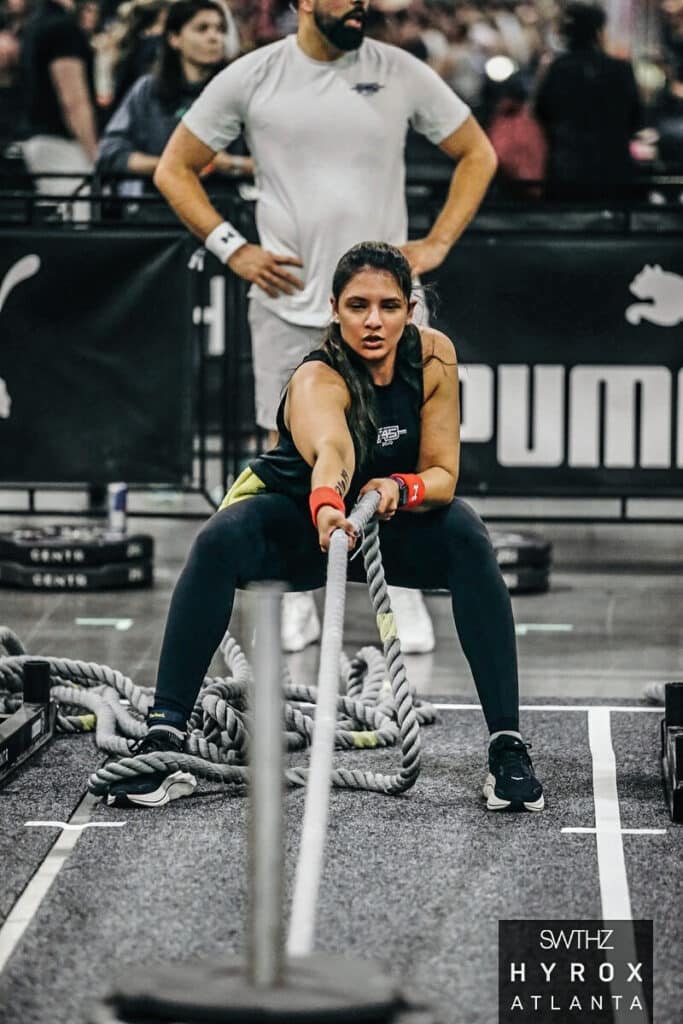


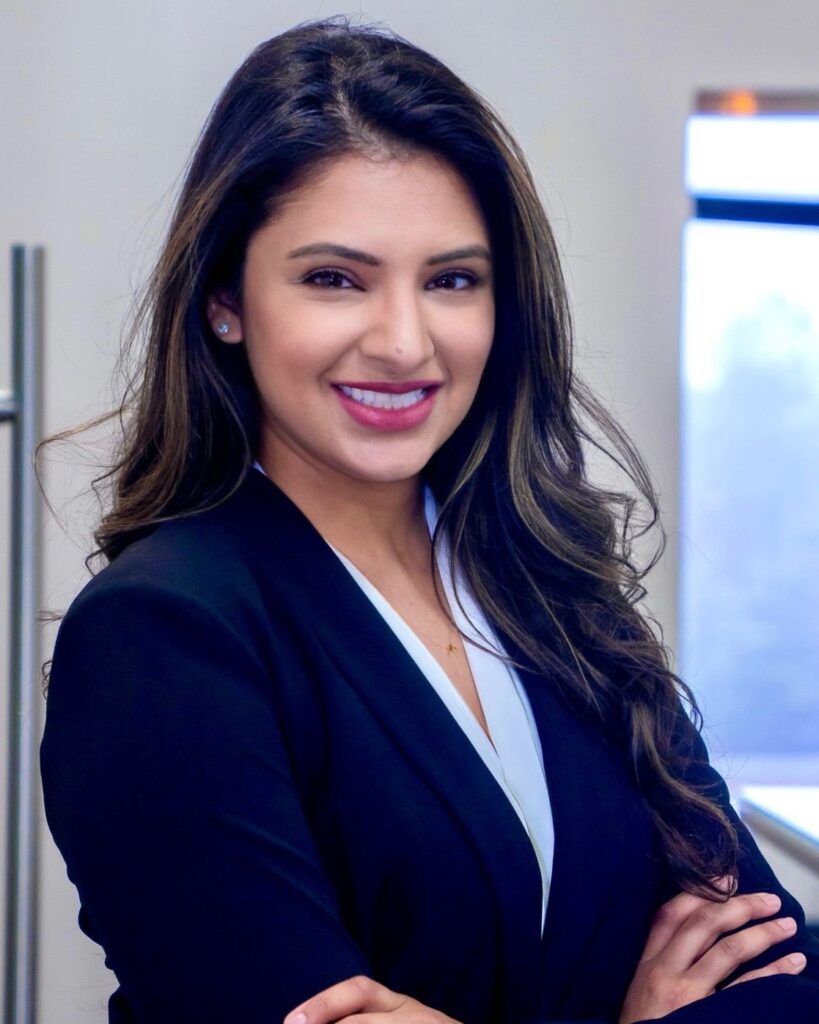




About Vandana Aggarwal
Vandana Aggarwal is the Vice President of Operations at Aggarwal Real Estate, her family’s commercial real estate investment and management firm. She brings a unique blend of strategic insight and operational excellence, shaped by her early career as a consultant at A.T. Kearney, where she advised Fortune 100 to 500 companies. A graduate of Georgia Tech, she also took a transformative detour from the corporate world to spend a year in India teaching yoga—an experience that continues to influence her leadership style today. At the core of her work is a deep commitment to family and a passion for building strong, connected communities.
Timestamp:
00:00:00 – Introduction and sponsors: Vox Pop Uli & EV Remodeling
00:03:12 – From Georgia Tech to global consulting
00:04:23 – Leading strategy for Fortune 500 companies
00:06:11 – The role of vision alignment at the C-suite
00:08:01 – Sabbatical becomes family business overhaul
00:09:35 – Bringing operational excellence to a growing real estate firm
00:12:02 – A year of yoga, nature, and healing in India
00:17:03 – Hiking Kilimanjaro, testing limits, and expanding self-trust
00:18:52 – Navigating family dynamics inside a business
00:21:56 – Planning for leadership transition: siblings, strategy, succession
00:24:06 – Rebranding the business: from American Management to Aggarwal Real Estate
00:26:33 – Where AI fits (and doesn’t) in real estate operations
00:30:04 – Legal, leasing, HR, and marketing efficiency with tech
00:31:01 – Community-focused retail and experiential shopping centers
00:32:00 – Reflections on AI, journalism, and digital trust
00:32:57 – Closing thoughts
Podcast Transcript
00:00:00 – Rico Figliolini
Hi, everyone. This is Rico Figliolini, host of UrbanEbb. This podcast comes out of the city of Peachtree Corners, and we have a special guest today. And if I don’t mess up the name, it’s Vandana Aggarwal.
00:00:15 – Vandana Aggarwal
Absolutely. You can call me V, Rico.
00:00:15 – Rico Figliolini
I’m going to call you V, trust me. And I’m Rico Figliolini, so a bit of a long name there. But V is VP of Operations of Aggarwal Real Estate here, based in Peachtree Corners? No, Norcross.
00:00:30 – Vandana Aggarwal
In Norcross, yeah. Norcross, Georgia.
00:00:32 – Rico Figliolini
Yeah, yeah. Just off 85, and?
00:00:34 – Vandana Aggarwal
Jimmy Carter.
00:00:35 – Rico Figliolini
And Jimmy Carter.
00:00:36 – Vandana Aggarwal
We’re completing each other’s sentences already.
00:00:39 – Rico Figliolini
But where are we doing this? We’re doing this from one of our great sponsors, one of our two great sponsors, Vox Pop Uli. Was this tastefully obnoxious? Let me tell you, I asked them to do a corner cut for us, and this is perfect. So they have the Moxie logo and stuff. So they’re branding, right? Same way they can brand your stuff. They’ll put your logo on anything. They’ve done, I think, 6,000 vehicle wraps. They’ve done garments, obviously. They could do one-offs or they could do 1,000. They do trade show booths, wraps, everything. So anything you need a logo on, think of what object you want it on. They’ll figure it out for you. And if you’re doing, let’s say, 5,000 mailers and you want that database customized for each postcard, they could do that also. It’s called data. I forget what it’s called, but they can do that. They can work the data into the printing as well. So all customizable. Check them out, voxpopuli.com. Now, getting to something we were talking about, hands-on stuff, which is this also. This can’t just be done by machines, right? Although machines, you still need people. But EV Remodeling Inc., they are a remodeling company. They can do design to build. They can do whole house renovation. They can create your deck, your backyard gazebo. They can put a bathroom, kitchen, anything you want. EV Remodeling Inc. is owned by Eli and his family. Lives in Peachtree Corners. It’s based out of our city. They’ve done, I think, over 250 homes recently. So check them out, evremodelinginc.com. And I want to thank both of them for being great sponsors of ours. So, it’s always a long stretch doing that, but I’m glad to have you, V.
00:02:22 – Vandana Aggarwal
I’m happy to be here. Thank you for inviting me onto your podcast. Excited to chat with you.
00:02:25 – Rico Figliolini
Yeah, no, this is cool. Well, you know, I met you, where did I meet you at? I think it was the chamber.
00:02:30 – Vandana Aggarwal
Yeah, the Southwest Gwinnett Chamber event.
00:02:32 – Rico Figliolini
Yeah, and we were talking a bit, and I was like, damn, you know, I had my father owned a business, and he wanted his kids to be in it. None of us, none of us could go into that business. It’s a little difficult, different industry. It was a hard industry, plus my father was very patriarchal, very over-demanding. God bless him. He mellowed in age. But when you were telling me about your family, I mean, your father, your mother, your sister, your brother, and you, I mean, all in it. It’s amazing.
00:02:55 – Vandana Aggarwal
We’re all together. We’re the modern-day Brady Bunch.
00:03:03 – Rico Figliolini
I love it. Yes, that’s exactly it. But, let’s start a little bit. I mean, you were telling me, I mean, you came from a consulting world. You came where you were actually being paid a lot more than you’re being paid right now, actually.
00:03:12 – Vandana Aggarwal
I told my father he couldn’t afford me when he recruited me out. So I graduated from Georgia Tech in 2007. I actually did join his company right out of college for two years, learned a lot about the company. He actually had me go through a rotation in every department of the company to learn more about what we did, how we operated. And I think very quickly, it was also 2008-9 with a recession. But I was also very interested to learn how big companies operate. How can you take a small company at that time? We were much smaller than we are today and really understand how do you go from this, which is where everyone starts, right? As a new company to get to be one of the largest in the nation, in the world and see how they operate, how they grew it from, you know, a mom and pop business to this global enterprise. Consulting was a natural transition to learn about multiple companies, multiple industries. So transitioned into AT Kearney, which has now been rebranded as Kearney, and out of their Chicago office. So I was there for seven to eight years, almost eight years.
00:04:23 – Rico Figliolini
Entry-level position you got in?
00:04:24 – Vandana Aggarwal
Yeah, I went in as an analyst. The good thing with that experience was by the time I left, I was a senior manager with Kearney. I worked across 17 different companies in those eight years. So I got to experience how CPG companies, retail companies, transportation, IT, you name it, I’ve done it. In terms of the different types of industries I got to work with, worked with a lot of Fortune 100 to 500 companies at the C-suite level. So we were coming up with all kinds of strategy projects such as new market entries, mergers and acquisitions. A lot of what I ended up specializing in in those seven years was operational efficiency and growth strategy. So it was an amazing, I’m grateful for that learning experience, the you know the caliber of minds that you work with. You also get to experience what the C-suite looks like. How does the very top operate and then it goes from the top down right? So it is very much led at this very top leadership and you see how companies change in their culture the way they operate based on how the top is designed.
00:05:38 – Rico Figliolini
So did you see good and bad at the top?
00:05:41 – Vandana Aggarwal
Absolutely. And I’m not going to name names. But you learn a lot when you see how your CEO and your C-suite right below them, the culture they’re bringing into a company and their vision and their goals if they’re aligned, unaligned. Anyone that at the very top have different viewpoints of where the company has had it is where companies start to break apart, lose revenue, lose their you know people, which is very important.
00:06:11 – Rico Figliolini
Where did you see the pain point then? What was the common denominator I guess of those?
00:06:18 – Vandana Aggarwal
There’s no one common denominator, but if I had to kind of narrow in, it comes down to what is our five-year, ten-year trajectory? Where are we headed? As large companies grow, you’re not just in one industry. You’re not just doing retail shopping centers. You’re investing in all kinds of properties just to bring it back to our company. Similarly, a CPG company can make all kinds of products, so they have to decide what it is because you have to be concentrated on the right places. If you have a leadership team that is in alignment of what that ultimate goal is, right, then you have clear strategies and, you know, metrics you’re measuring your success against. So that was a big thing that I learned. Also just, you know, seeing how great leaders operate, right? Some of the best in the nation today, I got to be in the room with them and just to see how they lead is very important.
00:07:14 – Rico Figliolini
Did you see any family dynamics in any of those businesses?
00:07:20 – Vandana Aggarwal
No. You know, there may have been like a father-son duo, but when you’re looking at the very top, I won’t say it was like all in the family, right? You know, and it also becomes the size of a company, right? You know, when you get to an international scale, you’re not always blessed that every person in your family has the right skill set and experience to fill each role on that C-suite.
00:07:46 – Rico Figliolini
I’m just thinking Trump for some reason. Every kid has a job.
00:07:51 – Vandana Aggarwal
Every kid has a job.
00:07:52 – Vandana Aggarwal
You had the accent, right?
00:07:54 – Rico Figliolini
Pretty much, I guess. So after the C-suite or expansion, you traveled a lot too, I think, right?
00:08:01 – Vandana Aggarwal
I did, yeah. So after my seven, eight years in consulting, I was reaching 30. And Shiv, my father, came to me and he said, you know, you’re doing this for a lot of outside companies. Why don’t you help us grow and bring your expertise home? And I said, look, I’ll take a sabbatical. Let me assess the company. And after that period where I took a short sabbatical to come look at how we were operating, I said, I can give you three years. I said, you can’t afford me, but I’ll give you three years of my time. And I said, I think it’ll be the right, it was the right time in the company. We were investing very heavily. We were bringing in a lot of new square footage into the company, and we weren’t designed to manage it. So we as a company, as you know, we are the investors. We have an in-house management company, an in-house leasing company. So as we acquire new properties, our team does the management for those properties in-house. We don’t provide third-party services today. And we do the leasing in-house. But at that time, when he, you know Shiv started we had one or two and now we’re at 50 shopping centers plus and other investments that we have. And there’s a very different way you operate you know and how do you how does the CEO go from being an operator to where he’s overseeing it, but he’s not into the weeds right? So he has create a system for that to happen right? You have to have standard operating processes for your property managers, your accounting team, your marketing team.
00:09:35 – Rico Figliolini
And you quite didn’t have that before.
00:09:37 – Vandana Aggarwal
We didn’t, no. And, you know, and I think that’s why he wanted to bring me in is because my strength is operations and I love it. I love going into messy places and cleaning them up.
00:09:49 – Rico Figliolini
Is that what you did when you were a consultant?
00:09:51 – Vandana Aggarwal
A lot of what I was concentrating on at the end of my consulting career, yes. So I did a lot of operational efficiency work. So we’d go in, assess the way companies were designed. And we’d interview hundreds of team members to understand what their role is. You know, what are they responsible for? How are they delivering? What are they measuring for success? And then we’d redesign the way they did that based on, again, bottom line, what are your ultimate goals for the company?
00:10:21 – Rico Figliolini
So you had to understand that before you got to that point. And you’re not making the decisions, the C-level.
00:10:29 – Vandana Aggarwal
Present, right? And similarly even with Shiv, when I first joined, I said, look, this is how I think we need to redesign the company from a bottoms-up perspective based on ultimately our goal of growth, doubling, tripling in size over the next ten years. And I think this is where the father dynamic came in. I guess he trusted me. And he said, do it. He just said, do it. And it was beautiful because right when you’re with large companies, it’s a lot of time before you get. Those decisions made and that trust, right? And so it was great. And he said, yeah, just put it into place.
00:11:07 – Rico Figliolini
See, that’s a great dad, actually. Some dads would be like, I don’t know about that daughter or son or whatever.
00:11:16 – Vandana Aggarwal
It did take time, though, like to ultimately, he was in the operation so heavily. And, you know, until today, I’m still like, step up, step up. Like, I need you to not get into the weeds. Like I think at that time we had tenants calling him, maintenance guys calling him. Like every little and big problem would go through his cell phone. I said, you’re too smart and you’re such a good investor. This is not your skill set. You shouldn’t be managing this. You need to bring people on who are expertise in this area. And I said, you need to be focused on like the larger plan.
00:11:51 – Rico Figliolini
This way you can grow it better.
00:11:51 – Vandana Aggarwal
Which I think has been very successful over the last eight years I’ve been with him now.
00:11:57 – Rico Figliolini
So before you got to him, though, you were traveling a bit internationally as well?
00:12:02 – Vandana Aggarwal
Yeah, yeah. So this is an amazing year. I was very burnt out. By the time I left consulting, I was working 70 to 80-hour weeks, traveling Monday through Thursday, if not more than that, of the week. So I told Shiv, I was like, I’m going to take a month. I’m going to go to India, get my yoga certification. No intention to teach at the time. I just said it’d be a great one-month retreat. And I was up in the mountains like Himalayas and India in a city called Dharamshala. Beautiful place. One of my favorites in the world. And I just, I think I needed it for myself emotionally, mentally to take that break. So I turned one month into one year. I didn’t know it was going to be a year.
00:12:49 – Rico Figliolini
In that same city? In that same town?
00:12:50 – Vandana Aggarwal
Yeah, so I ended up the school that I had gotten my certification with. I asked them, I was like, do you mind if I hang around for a little while? Like very casually, I’m like, you know, I’ll pay for my room and board, but I just want to be around this group and this energy. And they said, well, if you’re going to be here, why don’t you intern? And they’re like, room and board is free if you intern. I was like, sure. You know, not thinking what it was leading to. This is like that beauty of the universe coming into play. Yeah, so I started teaching, ended up loving teaching. So then I ended up teaching the 200-hour yoga training course. And I was in Dharamshala for four months. And then I moved down to Goa, their Goa campus for another six.
00:13:30 – Rico Figliolini
Where is that? Goa?
00:13:32 – Vandana Aggarwal
Goa? It’s in southern India on their west coast. It’s a beach town. Yeah. So I had the mountains and the beach. But I’m a mountain girl. I’m a hiker. But no, it was a beautiful experience. Very different from anything I’ve done with my career, right? But I became a yoga teacher for a year.
00:13:52 – Rico Figliolini
Did that clear your head? Yoga, they say, can do that, right?
00:13:53 – Vandana Aggarwal
Yeah, it’s all the tools of yoga, right? The meditation, the breath work, really getting internal, going in, right? Just going inwards, being quiet, which we don’t have. We have a lot of noise in our life today, you know? And naturally, right? Between family life, work life, social, and then just all of the noise from everything else right? Like we’re sitting here and I can hear the cars right? So you know that difference was when I was sitting there, I could hear the ocean waves and so there’s something very healing in nature naturally. So it was the tools mixed with nature and I still think nature has a very strong healing power on us. So whenever I can, I try to get out on a mountain and by the ocean. But yeah no it was it was a beautiful experience but it did bring a level of calmness into the way I approach things. It changes your perspective of you know at the end everything’s okay. No matter what you’re going through it’s temporary you’re, and everything that’s happening to us is happening to us for the good. We don’t know it, sometimes it seems like a bad situation in the moment, but ultimately you know, universe, God, whatever you believe in is at play to bring you something better in your life. And you just have to step back to understand what is it delivering us.
00:15:19 – Rico Figliolini
I like the way you think. My wife every once in a while would say, aren’t you upset about that? I’m like, I think come tomorrow, it won’t mean anything. There’s no point in, just relax. Not everything, two days later, it’s not as important as it seemed at that moment.
00:15:37 – Vandana Aggarwal
Yeah. And it’s not just that it’s not as important. It’s also like…
00:15:41 – Rico Figliolini
In perspective?
00:15:42 – Vandana Aggarwal
It’s, what am I gaining from this? Like, what can I gain from this? Oftentimes when, you know, a lot of things happen, yeah, like you get hurt or, you know, it’s like in relationships, right? Or if you have a bad business deal, right? It’s like, hey, how am I growing, right? And I think that’s what makes life very exciting, right? Otherwise, if you’re always living on a high, is it a high?
00:16:06 – Rico Figliolini
Yes. So I’m thinking you were a consultant for seven or eight years. 80 hours a week. And all of a sudden you’re doing yoga on the mountains of India. It’s just like, it’s almost like a movie. It’s almost like…
00:16:18 – Vandana Aggarwal
Eat, pray, love?
00:16:19 – Rico Figliolini
Yes.
00:16:20 – Vandana Aggarwal
It was my eat, pray, love moment for a year.
00:16:23 – Rico Figliolini
That’s amazing.
00:16:24 – Vandana Aggarwal
No, you meet amazing people, but I think we were meant to meet everyone that we come in interaction with on a daily basis. You naturally have a connection. There’s a universe at play, and we were meant to cross paths and learn something from each other, gain something from one another, give to the other person. And I think you just have to look at life that way.
00:16:48 – Rico Figliolini
I definitely think along that way. I mean, I definitely think each of us nudges each other in a crowd a little bit. That one nudge can set you off going in a different direction. So I totally believe in that. So you joined your dad. Yes. And you’re, so actually, even before we get there, so yoga, but what other interests have you been?
00:17:03 – Vandana Aggarwal
Yeah. So, I mean, I’m an avid hiker. I’ve done recently in the last few years, I’ve climbed Kilimanjaro. I did the Machu Picchu trail. I’ve done a few 14ers out in Colorado, but I like to test myself physically. You know, just, again, it comes down to how do we find that push within us past our comfort zone? So is this a physical inability or is it a mental constraint? So to get past that mental constraint of discomfort and then really push yourself to the next level and say, I can achieve something. It’s not going to be easy. So to me, if I’m on a hike and it’s not hard, I’m like, well, was it a hike? Like it didn’t test me, but no I think, you know.
00:17:55 – Rico Figliolini
You should do the Appalachian Trail. That’s like 2000 plus miles.
00:18:03 – Vandana Aggarwal
I know. And it is, you know, it’s not just like the hiking part. It is like living out in nature and, you know, sleeping in uncomfortable conditions. Yeah. Walking in the rain. It’s cold. I think the last day of our Kilimanjaro hike, it was negative 20 degrees up in the mountain and my eyelashes were frozen and I couldn’t feel any part of my body. And, you know, and it tested my breathing. And there is that element of push yourself to the point that it’s not your ego anymore. Like if your body’s saying stop, you have to stop as well and respect your body. But yeah, to really test yourself.
00:18:38 – Rico Figliolini
To circle all that back now, you’re back home. You’re working with your father and your family. A lot of businesses grow or die because of family. If it’s a family business, right?
00:18:52 – Vandana Aggarwal
Absolutely, yeah.
00:18:53 – Rico Figliolini
So you have your highs, your lows, your, sometimes you don’t get along. Sometimes decisions are split. People get upset with each other. So you’ve been at your highs and lows physically and mentally doing other things. Has that helped you in some ways? Not that you’re having a bad time with family. Because it sounds like you all fit just fine, like the Brady Bunch.
00:19:15 – Vandana Aggarwal
Let’s keep it that way. No, I mean, there’s multiple dynamics at play. It is a family business. My father is also my boss. My siblings are also my friends and my coworkers. And it’s about no matter how hard you try, you cannot separate those relationships. There is an interplay of all of it when you spend eight to nine hours a day together. But we all have, again, a common goal for the company. And then a common goal for our personal relationship. So when we sit down, we keep in mind that we like each other and we want to keep it that way. Like very simply put, that’s first and foremost for me especially. Even when Shiv had brought me in, he said, oh, can you manage everyone? And I said, I’ll manage everyone but my brother and sister. I said, you know, like I won’t jeopardize the relationship I have with them as a sibling by being their manager. Especially because I said that’s your job like good luck. But not just that it’s you know we all have different skill sets so I said how do I manage my brother who is a genius he’s a CPA by trade you know like I can’t tell him how to run the financials of this company like he’s supposed to teach me that right? And same way I teach him that. My sister has a master’s in marketing right? She is by far the most social, likable person you’re going to meet, and she knows how to work with people. I said, she needs to teach us that. So I think we’re lucky that each of us, and this is, I think, rare, where you have three kids and each one of them has their own skill set. That, I think, helps us stay in business and we see ourselves foreseeably into the long-term future being in business together is because we each bring something very unique to the table. Ultimately we value the relationships that we have on a personal level as a family above all else right? And then you know the element of like, how does the yoga experience a hiking experience teach us. That’s, it’s not specific to anyone’s situation, I think it’s a baseline of who you become right? The foundation. Like it teaches you patience, it teaches you again, everything is temporary so let’s not get overly attached emotionally or get upset or too joyful, even like, let’s just stay neutralized on any situation because it will end. And then the next one will come up and kind of flow with the ebbs and flows of the ocean. You, you flow with everything that comes with you, comes your way at work, at home. But yeah, I mean, we do sit down as a leadership team. I, my father and my siblings and I, and we talk about, hey, we separately do the exercise. Where are we going to be in five years? What role do we play in that journey? And thankfully, all of ours are very similar in what our goals are. And then we have different skill sets that we bring. So even as we design the future of the company in a moment where my father is not at the head of the table, we’re working on that redesign work. But it’s very conscious. It’s very intentional. Again, we all step back and say, hey, look, how do we maintain, how do we solve problems? Because like, you know, we were talking about how tomorrow we may not agree on something, a big decision. What are we investing in? Come back to, you know, right now Shiv gets to make an ultimate decision because he’s the one leader at the top. Tomorrow it’s going to be three people at the top. How do you deal?
00:23:04 – Rico Figliolini
So is there an exit plan for your dad? Well, not an exit plan.
00:23:09 – Vandana Aggarwal
Not an exit plan. He already has. I think he, you know, he’s gone from, he’s the hardest working person I know. I get that from him. We’re addicted to work.
00:23:18 – Rico Figliolini
80 hours a week.
00:23:21 – Vandana Aggarwal
We love working. You know, this company is his baby. I think I’ve adopted it at this point and we all have. But, to stay mentally sharp, to stay alive, you have to keep working. You have to keep doing something. You have to be working towards something that brings you joy and purpose. And I think, you know, he stepped back to take time towards a lot of his nonprofit work, community work that he’s very much engaged with. But he’s still at the top. He’s still running, you know, his, you know, he’s, you know, not slowing down. You know, we’re constantly growing. We’re growing this year in a large scale, which is amazing, and he’s leading that charge.
00:23:59 – Rico Figliolini
How many properties do you own?
00:24:02 – Vandana Aggarwall
Today we have 50 shopping centers and then a few other assets.
00:24:06 – Rico Figliolini
Is that like 3 million square feet or something? 4 million?
00:24:10 – Vandana Aggarwal
Yeah, over 700 tenants. But, you know, when we sat down a few years ago, we rebranded. Aggarwal Real Estate didn’t exist until two years ago. It was American Management Services. And we had a rebranding effort because we said we want the company’s name and the brand to represent who we are.
00:24:33 – Rico Figliolini
I like that, by the way.
00:24:35 – Vandana Aggarwal
Yeah, it needs to mean something. And we were also proud of what our father has achieved, right? He’s given us this beautiful life that we get to help grow upon. So we said it needs to pay homage to him. So we said, let’s make it Aggarwal Real Estate, ARE. And then as we were deciding what that vision is, we’re a family. In the company, we are a family, not just the four of us, but all of our staff, our team. We don’t, you know, we don’t look at them separate from who we are. And so we said our mission as a company is building communities as a community. And it talks about, hey, in all of the real estate work we’re doing, we try to make sure all of our properties are beautiful. Our tenants are happy. They have direct access to each of us in the company. And on top of that, as a company, we are a community within ourselves because we can’t create them until we are one. So it was very intentional to who we already were, but putting it into brand terms.
00:25:37 – Rico Figliolini
It’s amazing. All that property, tenants. Can’t imagine father tech can send text messages on all their problems, if they have any.
00:25:45 – Vandana Aggarwal
He’s a brilliant man.
00:25:45 – Rico Figliolini
You could be too possessed on that stuff. We want to be cognizant of our time together.
00:25:55 – Vandana Aggarwal
Absolutely.
00:25:57 – Rico Figliolini
So the next subject really was going to be about also AI, because everyone’s talking about AI. We were talking about that before the show started, before we started recording, which was kind of funny because V was asking me if we edit anything. And I was like, no, straight through.
00:26:11 – Vandana Aggarwal
I wanted to see if I could say a few things and then have it taken out of this conversation.
00:26:13 – Rico Figliolini
Nope. Nope. Doesn’t work that way. So, but ChatGPT, AI, that’s all. I mean, you know, could I create a bot to edit this? Probably. But there’s so many things we use in our lives. And you’ve been talking about how it would affect your business. Nevermind the consulting work you did.
00:26:33 – Vandana Aggarwal
Yeah. I mean, the consulting world is, I mean, it depends on the industry, the type of work you’re doing. In real estate, I’ve put a lot of thought behind this. There’s a lot of conversations happening across every industry, every sector, whether it’s education, automotives, real estate, et cetera. Everything’s being discussed. How is that changing the future? How do we incorporate it to be more efficient, right? Be the best in the industry that we can be or operate better. And so for me it’s again comes down to that operations element that I think about like, how do I incorporate it for a company that’s a medium-sized real estate firm today as we become a large company, a bigger player in the market. And people are very important in real estate right?
00:27:17 – Rico Figliolini
Talk about editing?
00:27:20 – Vandana Aggarwal
I was telling you, we should bring them into the podcast.
00:27:27 – Rico Figliolini
We’re going to run a little longer on this.
00:27:36 – Vandana Aggarwal
But let’s take retail shopping centers. This is brick and mortar. I did a paper actually for a large mall retailer back in my consulting days on how the title of the paper was, is brick and mortar dead? And, you know, full circle, I am fully dedicated to brick and mortar, retail, office, multifamily now. But you still need people to clean up your properties, fix your maintenance issues. We were talking about roofing, plumbing, electrical. That is hands-on work. You know, today there is, it’s going to be a long time before there’s a robot that comes in to do that. There will be. I don’t know. I do not see that in 10 years to say we’ve got roofers that are robotic drones that are going to come fix my roof problems.
00:28:24 – Rico Figliolini
Zumbas, they’re going to run around the roof or something.
00:28:26 – Vandana Aggarwal
That’s actually genius. A Zumba for my roof.
00:28:31 – Rico Figliolini
Why not? Attach it to the right thing.
00:28:33 – Vandana Aggarwal
But so those are very people-oriented roles today. Technology will advance how quickly it’s done or how well it’s done. But you’ll still need someone to operate the machinery of it and everything.
00:28:49 – Rico Figliolini
Just not as many.
00:28:50 – Vandana Aggarwal
Yeah. Construction, similarly, right?
00:28:54 – Rico Figliolini
Unless you 3D print a house. I’m sorry.
00:28:56 – Vandana Aggarwal
No, it’s true. It’s true. There’s so many options. I’m thinking 10 years now. I’m not going to have a 3D printer making the metal framing for my new construction project. You know, or installing the sheetrock, it does probably speed up the process, right? There will be machinery to help with that, a lot of AI development in that way. It’s a lot at an office administrative level, right? The speed in which you’re processing invoices, the speed in which you are, you know, getting payments taken in. Today, I would say as far back as right before COVID, we were still accepting checks for money. Now it’s all online. Like we do not accept money coming into the office, or it’s very limited to what we do, right? So that’s AI, if you think about it, right? The ability to pay online.
00:29:42 – Rico Figliolini
QuickBooks Online uses AI now, you can enable it.
00:29:47 – Vandana Aggarwal
So we’ve been using it for many years. The advancement of it has been a little bit slower, and now it’s sped up. Marketing, we were just talking about how you created a flyer on ChatGPT, was it?
00:30:00 – Rico Figliolini
I won’t talk about the student that’s helping us out here and how they use AI.
00:30:04 – Vandana Aggarwal
No, AI in school, right? But yeah, it’s an AI processor for my HR roles, right? Instead of reading 100 resumes, it’s going through the system to filter them out. Whether it’s writing contracts, I won’t lie. Legal jargon is coming out of ChatGPT today. And so it’s speeding up the way we’re doing work. But my legal team probably, and they won’t say it, should be using AI if they’re not. To help create some of this work right? So it’s like these companies are still going to be needed, but the way that they’re able to respond to us at a quicker, everything would just happen faster right? From typewriters to computers, everything.
00:30:49 – Rico Figliolini
Especially if they know that they just did a lease from you for this property in Texas, that we need three more leases done for three other places, it’s not going to be that much different, right? It’s a template.
00:31:01 – Vandana Aggarwal
It’s coming out a lot faster. Yeah, I mean the negotiations, that’s a people-to-people thing right? So I think thankfully in the real estate world we’re still going to need people. We’re still going to need buildings right? The way built, we were just talking about how a retail shopping center is no longer just for shopping. It has to be for entertainment. It has to be for bringing families in and giving them more than just, hey, go into a TJ Maxx and buy something, right? It’s like, what else are you getting when you’re at that center? Whether it’s a play space or events, we’re starting to do more events at our shopping centers. So it’s, again, serving the community.
00:31:39 – Rico Figliolini
We’re seeing that more. More of that happening. We could go on and on here.
00:31:46 – Vandana Aggarwal
Chatting with you.
00:31:46 – Rico Figliolini
Yeah, and we should probably do one on either AI in the marketplace. Or maybe a panel discussion on something similar.
00:31:51 – Vandana Aggarwal
Yeah, overall, yeah. That would be exciting.
00:31:55 – Rico Figliolini
Yeah, I think that would be cool.
00:31:56 – Vandana Aggarwal
I think it’s interesting to learn about kind of where every industry is heading. It impacts all of us.
00:32:00 – Rico Figliolini
For sure. I mean, the magazine business, I mean, it’s all like we have certain, we have AI rules. But, you know, AI is still being used to degree to research things. And to do certain things like that. You know, hopefully journalism isn’t just handed over. They do say 40% of the internet is AI written. So, which is kind of incestuous almost because it’ll just feed on itself at some point.
00:32:27 – Vandana Aggarwal
There’s a whole discussion about the validity and the trust behind digital content. In the next few years. I think it’s going to diminish.
00:32:35 – Rico Figliolini
Oh, yeah. I mean, I’m seeing videos now and it’s just like, it just looks so real. And you could not tell the difference, even voice-wise.
00:32:42 – Vandana Aggarwal
And that’s scary to think. It’s like, how do you trust what you see?
00:32:47 – Rico Figliolini
So on that note, and since this is not edited, so this is right from the beginning. So this is all true. But I want to thank everyone. I want to thank you, V, for being with me.
00:32:57 – Vandana Aggarwal
Thank you so much for having me. This was a great conversation.
00:33:01 – Rico Figliolini
It went by way faster than some of these go. So this is a great discussion. Thank you, everyone. I appreciate you for joining us. Thank you for Vox Pop Uli for the studio look and for letting us do it here, for being a sponsor and for EV Remodeling. Also, I want to thank Jeremy Pruitt behind the camera who has taken care. He’s a Paul Duke student. And it wasn’t him that I was talking about before, by the way. But all the work he’s done on the back end on this. So thank you, Jeremy. So thank you all. Thanks for being with us.
Related
Business
Peachtree Corners Grows Business Opportunities Through Economic Development
Published
4 weeks agoon
May 6, 2025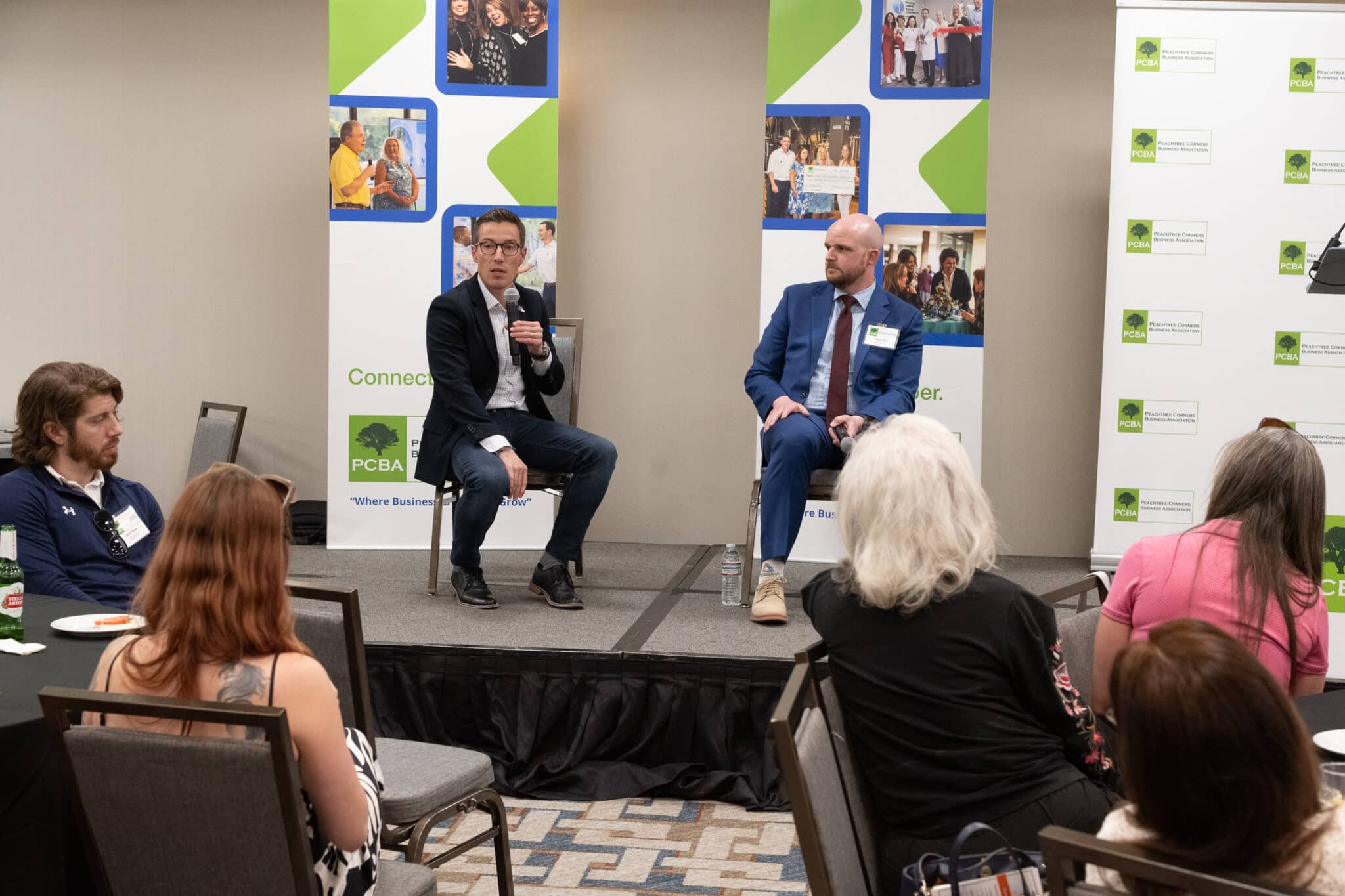
Most residents and business owners in Peachtree Corners probably think they know all about the economic development and strategic planning of Peachtree Corners, but do they really?
Peachtree Corners Business Association invited Peachtree Corners Economic Development Director Betrand Lapoire and Partnership Gwinnett Director of Economic Development Andrew Hickey to its After Hours Speaker Series on March 27 to discuss the city’s growth from a 1971 master plan to a bustling city with 42,000 inhabitants and 40,000 jobs.
Key points included the importance of business retention and expansion, with 24 projects last year creating 1,600 retained jobs, 1,600 new jobs and $250 million in new capital investment.
The Curiosity Lab, a world-class innovation center, was emphasized as a significant attraction. The city’s zoning and infrastructure plans were also discussed, focusing on balancing office and residential development to maintain a vibrant, sustainable community.
Matching jobs to residents
Although Peachtree Corners is just a teenager in terms of being an incorporated city, the foundation for this vibrant, fast-paced economic hub was laid more than 50 years ago by technology pioneer Paul Duke.
“Peachtree Corners was the first master-planned, business innovation technology park in metro Atlanta,” said Lapoire. “It was in response to the brain drain of technology with Georgia Tech graduates leaving the area.”
While the city may have a small-town feel, it’s the largest in Gwinnett County by population, but not land mass, he added.
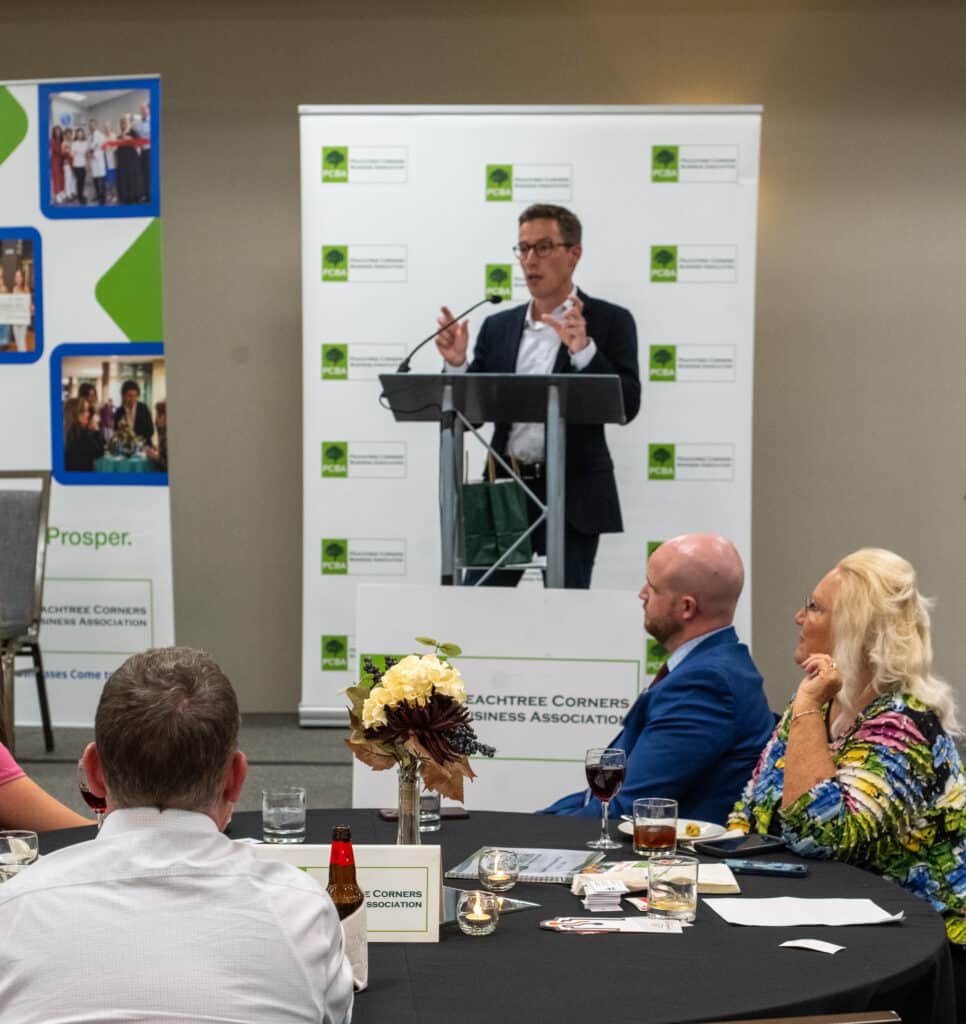
“The city started from a commercial, industrial, R&D base and then was expanded around it,” said Lapoire.
Though home to more than 42,000 residents, most of the jobs in Peachtree Corners are filled by people who live outside the city, he added.
“So we have this interesting mismatch, in a way, although not unusual,” said LaPoire. That creates traffic and transit issues. So that means that one of the solutions is to create more jobs here to fit the profile of the community.”
He presented charts that show professional services, consulting and engineering as the largest job categories. The next tier of businesses are wholesale and manufacturing.
“So we have a good mix of industry,” he said.
A five-year plan
The city has a five-year economic development plan (2023-2028) that outlines strategies for attracting and retaining businesses, with education and workforce development being key components.
Partnership Gwinnett has similar goals as Peachtree Corners, but on a larger scale.
“We are the county’s sales and marketing arm for all 17 cities now, and we receive funding from both municipal sources as well as existing businesses here — both in Gwinnett and outside of Gwinnett as well,” said Hickey.
He shared how Partnership Gwinnett is designed to drive a lot of major corporations toward doing business inside and with Gwinnett County.
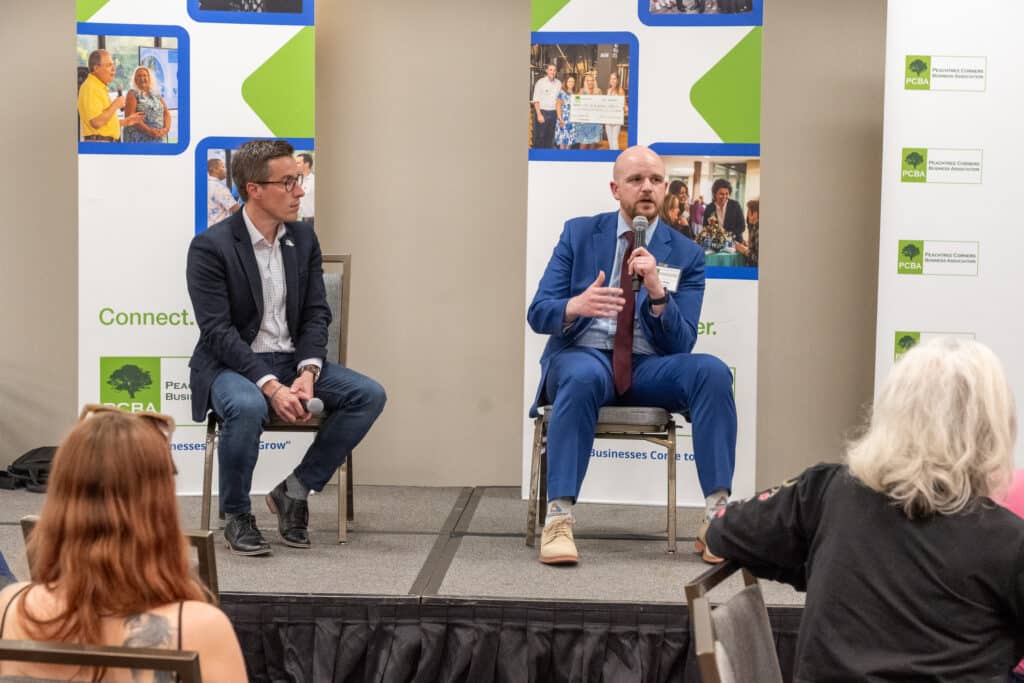
“One of the biggest things that we talk about that I’m sure it seems like most of us here, if you live here, you work here, you understand it. It’s the diversity that exists here in Gwinnett,” he said. “With a diversity index of 85, that means if we walk out of the Hilton here and we say hello to somebody, there’s an 85% chance they’re from a different ethnic or cultural background than ourselves, which to you and I may seem normal because that’s the life that we live in.”
He added that for companies, there’s a tremendous value in that, whether they have stated values, or they’re just making hiring decisions to get a wide range of candidates to fill those roles. Additionally, because of the proximity to Atlanta, Gwinnett County has a great labor draw.
Partnership Gwinnett
Partnership Gwinnett plays a significant role in recruiting businesses, expanding existing companies and developing the workforce. Hickey showed how the organization was involved with more than 24 projects last year.
“A majority of those were expansions, and that is a common thread you’ll see in economic development,” he said. “In business retention, expansion is so vital to working with our existing companies to make sure that they have the resources they need.”
He added that’s what leads to new investment and job creation in the community.
The organization also focuses on redevelopment projects, working with cities and the county to improve infrastructure and community amenities — especially strong educational institutions such Georgia Gwinnett College, Philadelphia College of Osteopathic Medicine and others.
Quality of life
In closing, both men stressed the importance of recruiting companies and developing the workforce, along with one aspect that means a lot but may not be as obvious — quality of life.
“It’s definitely evident that people like to work where they live — the whole live, work play experience,” said Hickey. “I joke that the part that people really have the most questions about, and are most excited to learn about, is new events at The Forum or Gwinnett Place Mall.”
Although they want to know what’s the next major company coming to Gwinnett, people REALLY want to know about how to spend their leisure time.
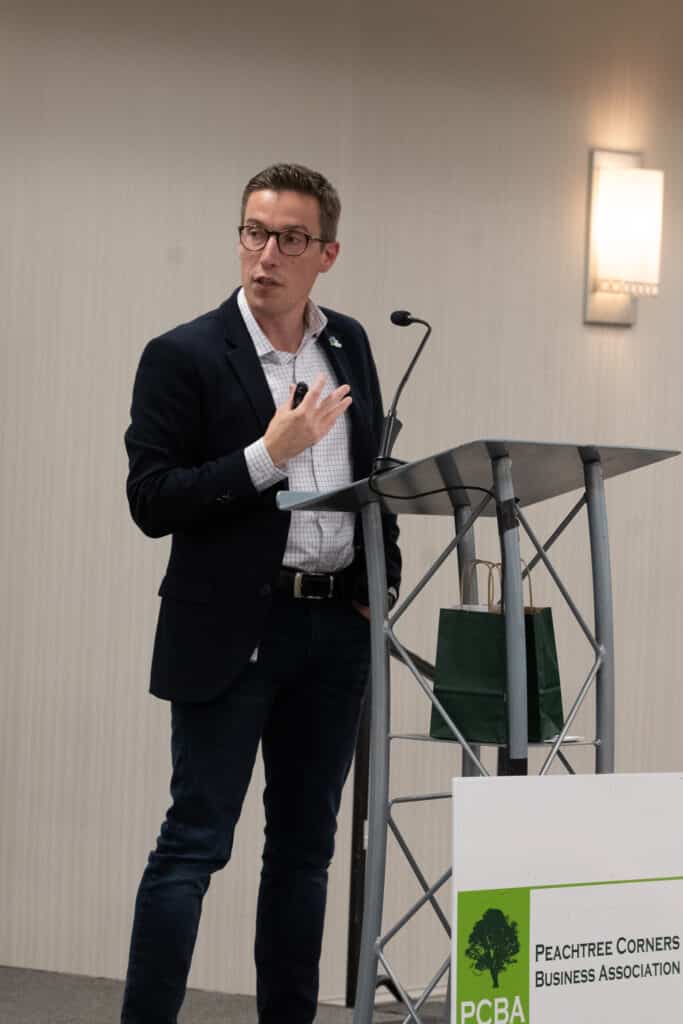
“That speaks to the importance of ensuring that we have a great community,” he said. “So at Partnership Gwinnett we work with all of our cities, and the county government as well, [on] a kind of a best-practices trip.”
He added that the peer tour allows everyone to know what the neighboring communities are doing and share the good news.
“We will take all of these elected officials, but also city staff, to different cities across the Southeast,” he said. “Last year, I believe they went to Huntsville, and have been to Greenville, Chattanooga — all cities that have done some really cool redevelopments that have taken their city to the next level. Our goal is to learn from them.”
Related
Read the Digital Edition
Subscribe
Keep Up With Peachtree Corners News
Join our mailing list to receive the latest news and updates from our team.
You have Successfully Subscribed!

Guardians of the Jukebox to Play the VoxStage on May 31

“Geek Culture” Shines at 2025 MomoCon

Brandon Branham Honored for Transformative Leadership in Peachtree Corners

Music Matters Productions Expands Peachtree Corners Headquarters

Celebration and Community: ICAGeorgia Wraps Up School Year with Two Festive Events

Vox-Pop-Uli Launches RED Initiative for Veterans’ Support

The PCBA Awards $500 to Light Up The Corners at After-Hours Event

City Collaborates with DNR for Deer Overpopulation Solutions

City Collaborates with DNR for Deer Overpopulation Solutions

Peachtree Corners Festival Awards Debbie Mason Drama Scholarship for 2025

Vox-Pop-Uli Launches RED Initiative for Veterans’ Support

The PCBA Awards $500 to Light Up The Corners at After-Hours Event

“Geek Culture” Shines at 2025 MomoCon

Celebration and Community: ICAGeorgia Wraps Up School Year with Two Festive Events

Guardians of the Jukebox to Play the VoxStage on May 31

Music Matters Productions Expands Peachtree Corners Headquarters

Light up the Corners [Video]

Capitalist Sage: Business Leadership in Your Community [Podcast]

Cliff Bramble: A Culinary Adventure through Italy

Top 10 Brunch Places in Gwinnett County

A Hunger for Hospitality

THE CORNERS EPISODE 3 – BLAXICAN PART 1

Top 10 Indoor Things To Do This Winter

The ED Hour: What it takes to Remove Barriers from Education








